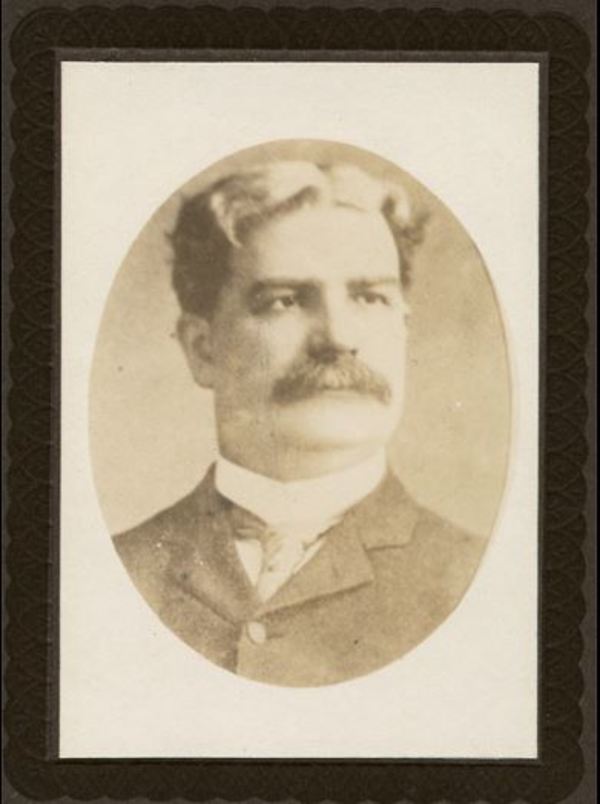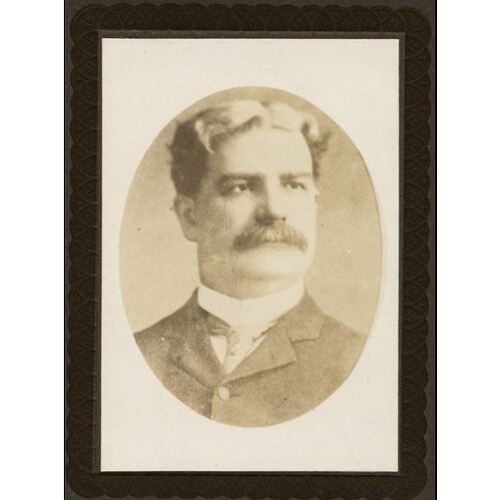As part of the funding agreement between the Dictionary of Canadian Biography and the Canadian Museum of History, we invite readers to take part in a short survey.

Source: Link
DEVLIN, CHARLES RAMSAY, politician and office holder; b. 29 Oct. 1858 in Aylmer, Lower Canada, son of Charles Devlin and Ellen Roney; m. 27 Sept. 1893 Blanche de Montigny in Sainte-Scholastique (Mirabel), Que., and they had eight children; d. 1 March 1914 in Aylmer.
Charles Ramsay Devlin’s father, who had left Roscommon (Republic of Ireland) in 1842, was an important merchant in Aylmer; he operated a general store and would twice serve as mayor. Devlin’s uncle Bernard Devlin* was a lawyer in Montreal and would become a prominent politician. His father was a generous benefactor of the local church and religious congregations and he and his wife reared the family as devout Roman Catholics. They ensured that their sons were given a university education and two of them continued the family tradition of political activism: Charles Ramsay and Emmanuel Berchmans would be elected to parliament. Another son, Owen Bernard, became a prominent Jesuit priest.
Devlin attended the Petit Séminaire de Montréal from 1871 to 1877. He studied in the faculty of arts at the Université Laval from 1879 to 1881 but appears to have left without graduating, likely to join his father in business. He is said to have been a merchant and a journalist, but little is known about these aspects of his career. In 1891 he was chosen as the federal Liberal candidate for Ottawa County, a seat which had been held by Conservative Alonzo Wright* since 1867. On the campaign trail Devlin was helped by his friend Henri Bourassa*, then mayor of Montebello. Considered a friend of French Canadians, Devlin was an attractive candidate for both the Irish and the French communities and he became known for his animated oratory. His father reportedly assumed his election expenses of $5,000 and he was elected on 5 March 1891.
On the hustings, Devlin was a valuable asset to party leader Wilfrid Laurier, whom he often represented at political conventions and election meetings, but in the House of Commons he proved more difficult. Known for his hot temper, he was easily goaded by his opponents. He broke with Laurier and the Liberal party over the Manitoba school question [see Thomas Greenway*]. In February 1896 Mackenzie Bowell’s government introduced a remedial bill to restore educational rights to Manitoba’s Roman Catholics. Devlin voted with the government on an amendment introduced by Laurier which would have killed the bill. Declaring “I am a Catholic before being a Liberal,” he was one of a handful of Liberals who openly disagreed with Laurier’s position. Aware that his voting record ended all possibility of political advancement, he none the less continued on good terms with his leader. In the general election of 23 June 1896 he was returned for Wright – his former riding had been split into two – and Bourassa for neighbouring Labelle. Devlin resigned his seat on 15 March 1897, choosing to leave the house rather than censure his party over the Laurier-Greenway compromise on the school question. Before leaving he had secured an appointment from Laurier as Canada’s first trade commissioner in Ireland.
In Dublin Devlin’s main activities were the encouragement of Irish emigration to Canada and the development of trade links. A gifted public speaker, he toured Ireland making speeches and earned popularity for his support of the port of Galway (Republic of Ireland) as another destination for a fast mail service from Canada to the United Kingdom. Devlin’s tenure was marred by periodic battles with the minister to whom he reported, Clifford Sifton*, over his handling of the Dublin office and by criticism from the opposition in the House of Commons. The Conservatives saw the office as a sinecure for a party hack and criticized Devlin for his spending habits and his open support of Home Rule for Ireland. Stung by the criticism and the meek defence offered by his former colleagues in the house, Devlin responded publicly in the Montreal Herald. For this intervention he was formally censured by Sifton. Devlin became increasingly disenchanted with his post. Against the advice of Laurier, he presented himself as a candidate of the Nationalist party for the riding of Galway in the British House of Commons, a move which prompted Sifton to force his resignation as trade commissioner. Devlin was elected by acclamation in Galway. At Westminster he lobbied for the mail service and argued that Ireland should be granted the same independence accorded to Canada. He became secretary general of the United Irish League in 1903 and held the position until 1906. On his return visits to Canada, he appeared at rallies, occasionally with Bourassa, denouncing British imperialism and advocating Home Rule. He was acclaimed for Galway on 15 Jan. 1906 but resigned his seat on 6 October to re-enter Canadian politics.
Laurier had several times encouraged Devlin to return to the House of Commons, offering him a seat in Nipissing in 1902 and the nomination in Wright in 1904. On his arrival, Devlin immediately set to work. He often debated with Bourassa, who had left the Liberal party, and whose vitriolic denunciations of him and Laurier caused him despair. On 29 Dec. 1906 he was elected to the commons in a by-election in Nicolet.
Devlin resigned on 29 Oct. 1907, having been sworn in as minister of colonization, mines, and fisheries in the provincial government of Lomer Gouin* two weeks earlier. In Quebec City he provided a listening-post for Laurier, with whom he corresponded regularly, mostly about patronage and the selection of candidates for parliament. He continued to lobby Laurier on Irish matters, spearheading a campaign for the release from prison of the Irish-born Welland Canal terrorists, and promoting the appointment of Irish Catholics to government positions. As minister, he was chiefly responsible for the encouragement of settlement in uninhabited parts of Quebec and the construction of roads and railways to serve the new communities. Elected for Nicolet in a by-election on 4 Nov. 1907, he was re-elected in 1908. In 1912 he won in two ridings, Nicolet and Témiscamingue. He resigned Nicolet on 14 November and remained as member for Témiscamingue and minister until his death.
Imbued with religion from birth, Devlin was a lifelong advocate of rights and privileges for Catholics. He was a signatory to the address from the Liberal party taken to Rome by Jean-Baptiste Proulx* which resulted in the appointment of the apostolic delegate Rafael Merry del Val to Canada in 1896. He was a generous supporter of Roman Catholic institutions. After St Paul’s Church in Aylmer burned in 1904, he donated $400 to its reconstruction. He was given honorary llds from the Université Laval in 1908 and the University of Ottawa in 1910.
The Montreal Herald commented that “Devlin’s aptitude for politics is very great.” He was “a born politician, and few have an equal facility for the use of the English and French language.” In fact, while Devlin was indeed political, he was never a party man. Educated in French institutions, and married to a member of a distinguished French Canadian family from Terrebonne, he moved easily within Quebec’s Irish and French Catholic communities. He was attracted to the tenets of liberalism, which he believed would bring Catholic emancipation and equality both in Canada and in Ireland. Personally loyal to Laurier, he broke with the party on several occasions, when he felt that his leader had strayed from the fundamental principles of liberalism by not supporting the rights of Roman Catholics.
ANQ-M, CE6-22, 27 sept. 1893. ANQ-O, ZQ2, 9, 1er nov. 1858. NA, MG 26, G: 56157, 56162, 56463, 56467, 63652, 63654, 66757, 70617, 70870, 87821, 87832, 92165, 111425, 114550, 114745, 114879. Lucien Brault, Aylmer of yesterday (Aylmer, Que., 1981), 168, 195. Canadian men and women of the time (Morgan; 1912). E.-E. Cinq-Mars, Hull, son origine, ses progrès, son avenir (Hull, Qué., 1908), 131–32. CPG, 1891–97, 1907–14. Directory, Aylmer, 1872. DPQ, 226. [J.-L.-] O. Maurault, Le collège de Montréal, 1767–1967, Antonio Dansereau, édit. (2e éd., Montréal, 1967). Qué., Assemblée Législative, Débats, 11 janv., 14 nov. 1912. Robert Rumilly, Henri Bourassa; la vie publique d’un grand Canadien (Montréal, 1953), 16–18, 161; Hist. de la prov. de Québec, 11: 70–73. The storied province of Quebec; past and present, ed. William Wood et al. (5v., Toronto, 1931–32). Univ. Laval, Annuaire, 1879–81, 1909/10. Who’s who of British members of parliament . . . , ed. Michael Stanton and Stephen Lees (4v., Brighton, Eng., and Atlantic Highlands, N.J., 1976–81), 2: 94.
Cite This Article
Alexander Reford, “DEVLIN, CHARLES RAMSAY,” in Dictionary of Canadian Biography, vol. 14, University of Toronto/Université Laval, 2003–, accessed March 29, 2025, https://www.biographi.ca/en/bio/devlin_charles_ramsay_14E.html.
The citation above shows the format for footnotes and endnotes according to the Chicago manual of style (16th edition). Information to be used in other citation formats:
| Permalink: | https://www.biographi.ca/en/bio/devlin_charles_ramsay_14E.html |
| Author of Article: | Alexander Reford |
| Title of Article: | DEVLIN, CHARLES RAMSAY |
| Publication Name: | Dictionary of Canadian Biography, vol. 14 |
| Publisher: | University of Toronto/Université Laval |
| Year of revision: | 1998 |
| Access Date: | March 29, 2025 |



